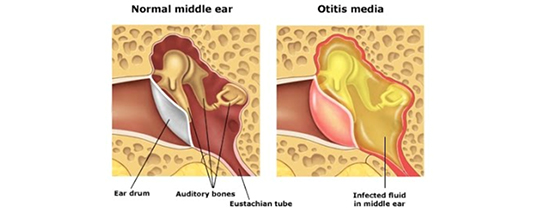How to Care for Your Child with an Ear Infection
This leaflet will provide you with information about Ear Infection, symptoms, diagnosis, treatment, prevention, and home care advice

What is an Ear Infection?
An ear infection - or otitis media- is a common infection in children. Viruses or bacteria can cause this condition. It often occurs in children after they get a cold. It affects the space behind the eardrum called the middle ear. Fluid can build up in the middle part of the ear behind the eardrum. This fluid can become infected and press on the eardrum, causing it to swell
What are the symptoms of Ear Infection?
- Fever
- Pulling on the ear
- Less active than usual
- Having less appetite and eating less than usual
- Vomiting or Diarrhoea
- Ear pain and temporary hearing loss
How is Ear Infection diagnosed?
The doctor will ask a few questions about your child's health and then examine your child. Your doctor will look into your child's ear. Usually no further tests or blood tests are required.
How is Ear Infection treated?
Not all ear infections require antibiotics treatments because some of them are caused by viruses and antibiotics and doesn't kill viruses. In addition, most children get better without antibiotics. You will be advised by the doctor if your child requires treatment with antibiotics.
If your doctor advises giving medicine for pain or fever, you can give:
- Paracetamol (any brand) or Ibuprofen (any brand)
- Follow the instruction on the medicine package for the correct dose for your child
- Do not give Aspirin to your child as this can cause serious complications
Home care advice
- Make sure your child takes all the antibiotics -if required- regularly and as prescribed. Even if the child feels better after a couple of days, you should complete the course of antibiotics.
- Ensure your child is up-to-date with vaccination
- Ear Infection doesn't spread from one to another; however, cold and viruses are contagious.
How is Ear infection- caused by a virus- prevented?
To prevent the spread of viral infection, please ensure the following:
- Teach your child to cover his/her mouth and nose when coughing or sneezing, use a tissue and dispose of immediately.
- Teach your child to sneeze/cough into the sleeve of one's clothing (at the inner elbow). If no tissues are available
- Teach your child to wash hands with water and soap after coughing or sneezing, or blowing his/her nose
- Teach your child to use alcohol-based hand rubs if water and soap is not available
When should I seek medical advice?
Seek medical advice if your child:
- Has pain or fever after 2-3 days.
- Has fluid or blood coming from the ear.
- Is not drinking.
- Is vomiting
Go to the Emergency Department if your child:
- Has swelling or pain in his neck or stiffness
- Has a swollen red ear
- Is unable to drink any liquids
- Appears very sick and less energetic

